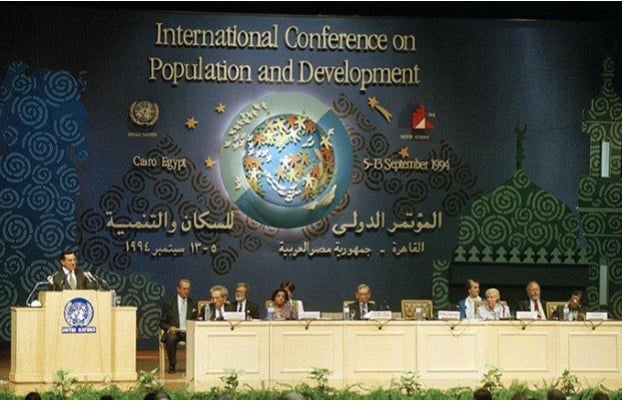
Организация Объединенных Наций, Нью-Йорк – В текущем году мир отмечает 25-летний юбилей МКНР – целый рубеж в репродуктивном здоровье и репродуктивных правах. Но что такое МКНР? И что это значит для ваших прав сегодня?
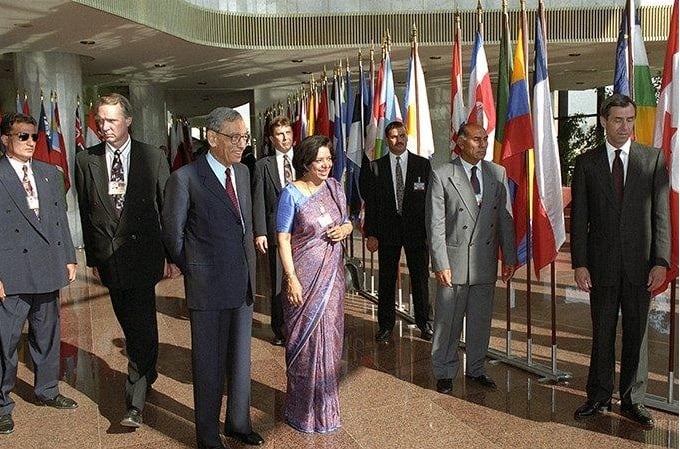
Генеральный секретарь Бутрос Бутрос-Гали (второй слева) и Исполнительный директор ЮНФПА Нафис Садик на конференции МКНР. © Фото ООН
ЧТО ТАКОЕ МКНР?
МКНР означает Международная конференция по народонаселению и развитию - встреча которая состоялась в 1994 году в Каире, где 179 государств мира адаптировали революционную Программу действий и призвали, чтобы репродуктивное здоровье и права женщин заняли центральное место в национальном и глобальном развитии.
В частности, Программа действий призвала обеспечить для всех людей доступ к комплексным услугам по охране репродуктивного здоровья, включая к услугам по планированию семьи, безопасной беременности и родовспоможению, а также профилактике и лечению инфекций, передающихся половым путем.
Было также признано, что репродуктивное здоровье и расширение прав и возможностей женщин взаимосвязаны и очень важны для развития общества.
«Полное и равное участие женщин в гражданской, культурной, экономической, политической и социальной жизни на национальном, региональном и международном уровнях, и ликвидация всех форм дискриминации на основе гендера, являются приоритетными задачами международного сообщества» подтверждено Программой действий.
Сегодня МКНР часто используется как сокращение для обозначений глобального консенсуса о том, что репродуктивное здоровье и права – это права человека, которые являются непременным условием расширения прав и возможностей женщин, а равенство женщин является непременным условием обеспечения благополучия и процветания всех людей.
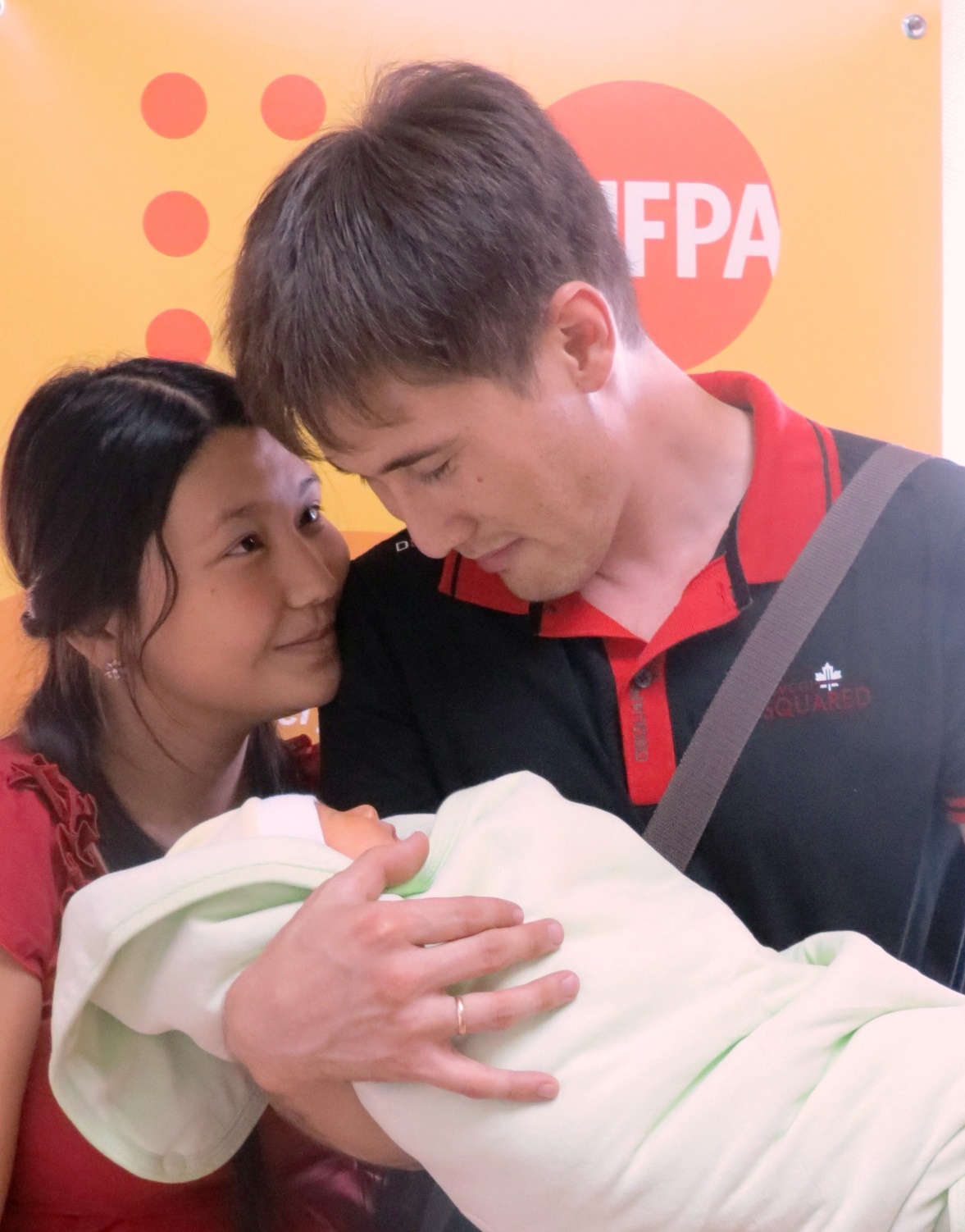
Новоиспеченные родители покидают родильный дом © Фото ЮНФПА Казахстан
КАК МКНР ИЗМЕНИЛА МИР?
В 1960-х, когда уровень смертности в мире начал снижаться, некоторые исследователи и политики начали паниковать по поводу роста населения, которое может превысить существующие природные ресурсы, что, по их мнению, должно было привести к голоду и социальному коллапсу.
В ответ на это действия правительств были следующие. Некоторые начали проведение исследований влияния роста населения на экономику и окружающую среду, другие сфокусировали усилия на программы планирования семьи, а некоторые предприняли действия, иногда принудительные, чтобы снизить уровень рождаемости.
Программа действий МКНР объединила мировое сообщество и отражает новый консенсус в ответ на рост населения. Четко подтверждено, что права и достоинство людей, а не целевые показатели населения, являются лучшим способом для реализации собственных целей рождаемости каждого человека. Кроме того, правительства признали, что эти права необходимы для глобального развития.
МКНР повторно подтверждает, что обеспечение репродуктивного здоровья и расширение прав и возможностей женщин являются обязанностью каждой страны и сообщества.
ПОЧЕМУ ЛЮДИ ОБСУЖДАЮТ МКНР СПУСТЯ 25 ЛЕТ?
ООН докладывает о достигнутом прогрессе в выполнении Программы действий МКНР. На ежегодном заседание Комиссии по народонаселению и развитию, ООН рассматривает состояние репродуктивного здоровья и прав во всем мире. Это включает достигнутый прогресс и упущенные возможности в усилиях по расширению прав и возможностей женщин, обучению девочек и ликвидации гендерного насилия.
Эти ежегодные обзоры показывают, сколько еще предстоит сделать. Несмотря на 25 лет соглашения, большой прогресс замедлился и некоторые меры были приостановлены.
Добровольный доступ к современной контрацепции увеличился на 25 процентов с 1994 года, и качество услуг по планированию семьи также значительно улучшилось. Тем не менее, сотни миллионов женщин все еще не используют современные контрацептивы для предотвращения нежелательной беременности.
Предотвратимые случаи материнской смертности снизились на 40 процентов, однако мир все еще находится в нескольких милях от поставленной цели Программы действий МКНР по сокращению материнской смертности до уровня менее 75 на 100,00 живорожденных.
Также были широко распространены действия, направленные на прекращение таких вредных практик, как калечащие операции на женских половых органах (женское обрезание) и детских браков. Например, в странах с высокой распространенностью женского обрезания доля девушек, подпадающих под эту практику, сократилось с 49 до 31 процента. Все же в связи с ростом населения, общее количество женщин и девочек, охваченных программами профилактики, фактически выросло.
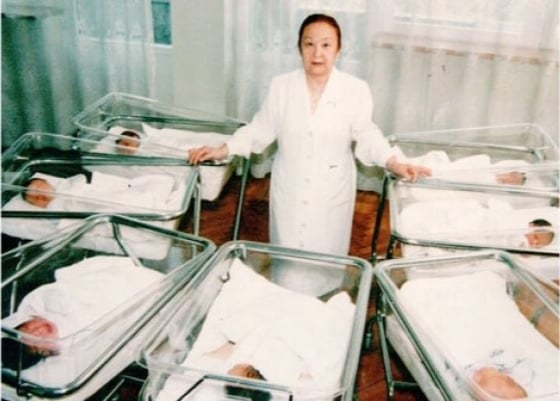
Нина Каюпова была в составе казахстанской делегации на МКНР в Каире в 1994 году
ИТАК, ЧТО ЛЮДИ ДЕЛАЮТ ПО ЭТОМУ ПОВОДУ?
В ноябре этого года правительства, правозащитники, организации здравоохранения, женские и молодежные активисты и другие, соберутся в Кении на Саммите в Найроби. Там будут рассматриваться обязательства, которые необходимо принять для продвижения целей МКНР и обеспечения прав и достоинства всех.
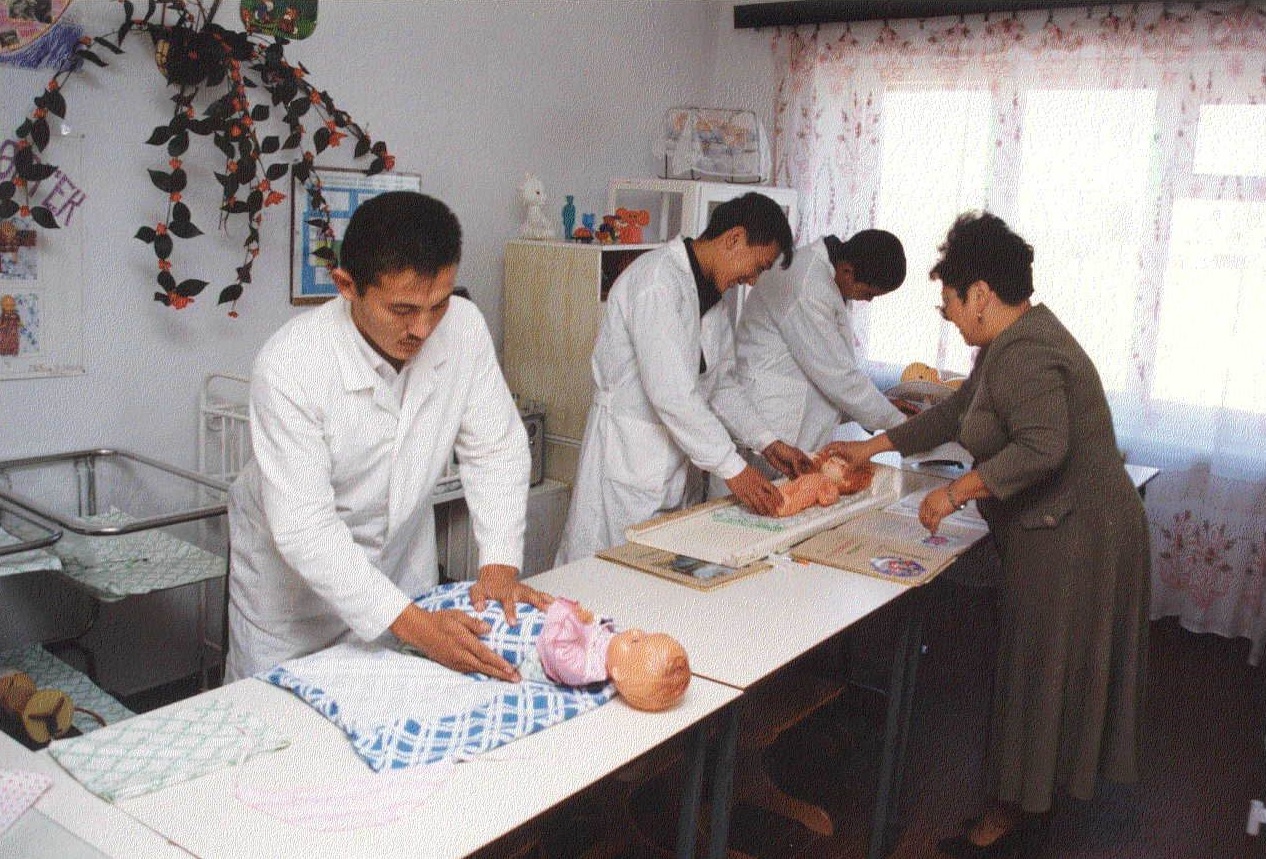
КАЗАХСТАН И МКНР
Нина Каюпова, акушер-гинеколог, доктор медицинских наук, профессор, заслуженный деятель наук Казахстана, бывший сенатор Парламента Республики Казахстан и заслуженный член Академии Наук Казахстана была в числе восьми делегатов, представлявших Казахстан на исторической встрече МКНР 25 лет назад. На одном из недавних мероприятий ЮНФПА, посвященном 25-летию Конференции, Нина Каюпова была одной из основных спикеров.
«На конференции было 10 тысяч участников. Оспаривали каждую цифру, каждую букву и каждое предложение в Программе действий. Конечно, проблема народонаселения и развития – очень актуальная и острая. Потому что именно от численности населения и от качественного состава населения, от человеческих ресурсов, от трудового капитала зависит устойчивое развитие государства», - говорит Нина Каюпова.
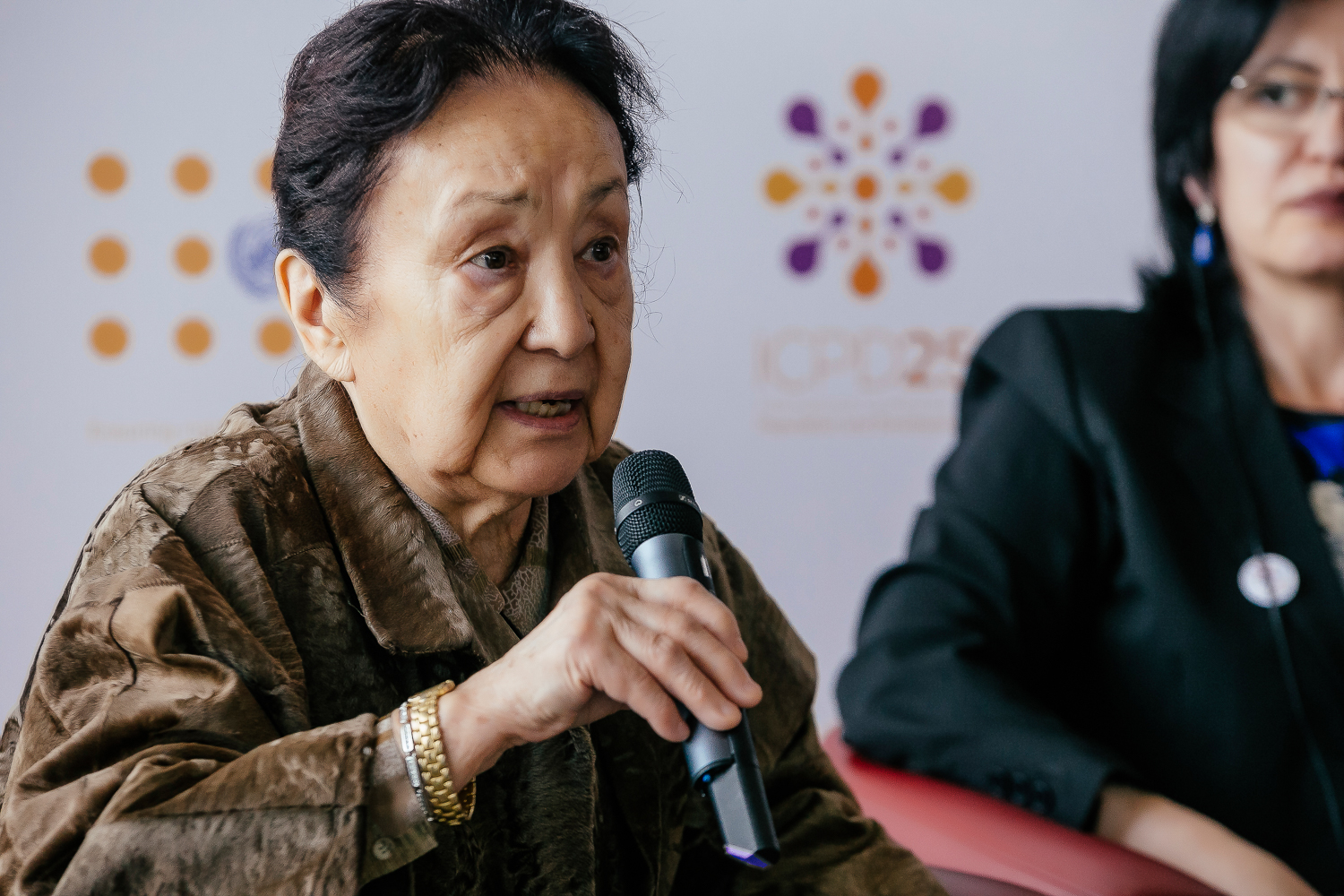
Нина Каюпова на мероприятии, посвященном выпуску Доклада о народонаселении в 2019 году
Нина Каюпова поделилась мнением о том, какое влияние оказала Программа действий МКНР на Казахстан 25 лет спустя. Она подчеркнула, что, учитывая, что молодые люди в возрасте 15-24 лет составляют 15% населения Казахстана, репродуктивное состояние молодежи будет определять будущее всей страны.
«И поэтому сегодня мы должны говорить не просто о репродуктивном здоровье, а о целой системе – о репродуктивном потенциале, - говорит Нина Каюпова. - Что это такое? Это репродуктивные права и репродуктивное здоровье. В Казахстане самая высокая активность, с точки зрения рождаемости наблюдается в возрасте от 25 до 29 лет, пик рождаемости – 25 лет, т.е. 180 родов на каждые 1000 женщин этой возрастной группы».
Нина Каюпова подчеркнула, что МКНР привела к ряду прорывных институциональных изменений во многих странах, в том числе и в Казахстане.
«В Платформе действий каирской конференции 14 глав. И самая главная основная глава посвящена семье, роли семьи, статусу женщины, охране материнства и детства, репродуктивному здоровью, - говорит Нина Каюпова. - «Но самое главное, в 1995 году настолько была проявлена мудрость нашего Первого Президента, что он создает Совет по проблемам семьи, женщин и демографической политике. Сегодня на базе Совета создана Национальная комиссия по делам семьи и женщин, и мы тесно взаимодействуем опять же с Фондом ООН в области народонаселения. Но самым знаменательным событием стало то, что в 1996 году г-жа Нафис Садик на базе нашего Республиканского научного центра проводит конференцию для азиатского-тихоокеанского региона именно по реализации Платформы действий каирской конференции. Участвуют 11 государств. Г-Жа Нафис Садик не случайно выбрала тогда Казахстан потому что по тем отчетам, которые мы давали после каирской конференции, что делается в каждом государстве, была проведена такая плодотворная, интересная, творческая работа с ЮНФПА».
ПУТЬ К НАЙРОБИ
С 12 по 14 ноября 2019 г. В Найроби пройдет Саммит, посвященный МКНР25. Саммит в Найроби – это возможность сверить достижения, осуществленные на пути к реализации МКНР, а также незавершенные дела.
Если мы не сможем достигнуть целей, обозначенных в Программе действий, таких, как обеспечение доступа к контрацепции или ликвидация гендерного насилия, то достижение Устойчивых целей развития будет невозможным. Таким образом, ключевые цели звучат так:
● Получить крепкую политическую приверженность важности повестки каирской МКНР.
● Создать политический и финансовый импульс для продвижения повестки МКНР, как неотъемлемой части Повести 2030, особенно в области снижения (как минимум) предотвратимых случаев материнской смертности, неудовлетворенной потребности в области планирования семьи и ликвидации насилия и вредных практик в отношении женщин.
● Предложить инклюзивную платформу для широкого круга стран-членов и других партнеров с целью мобилизации всеобщих усилий для обеспечения универсальных принципов доступа к правам и выбору для всех.
К КАКИМ РЕЗУЛЬТАТАМ ПРИВЕДЕТ САММИТ В НАЙРОБИ?
Участникам и заинтересованным сторонам будет предложено подготовить и зарегистрировать обязательства по продвижению Программы действий МКНР и сообщить конкретные действия для коллективных и индивидуальных действий. Показательно, что обязательства могут включать, среди прочего:
Коалиции / партнерства между правительствами, частным сектором и НПО для усиления систем качественного сбора данных, поставок товаров планирования семьи; улучшение системы здравоохранения; политики продвижения соответствующего возрасту Всеобъемлющего полового образования; законодательство, защищающее женщин и девочек от насилия и вредных практик, программы по поощрению гендерного равенства и снижению уровня насилия; ускоренное обучение и программы поддержки профессионально подготовленных акушерок и т. д.

